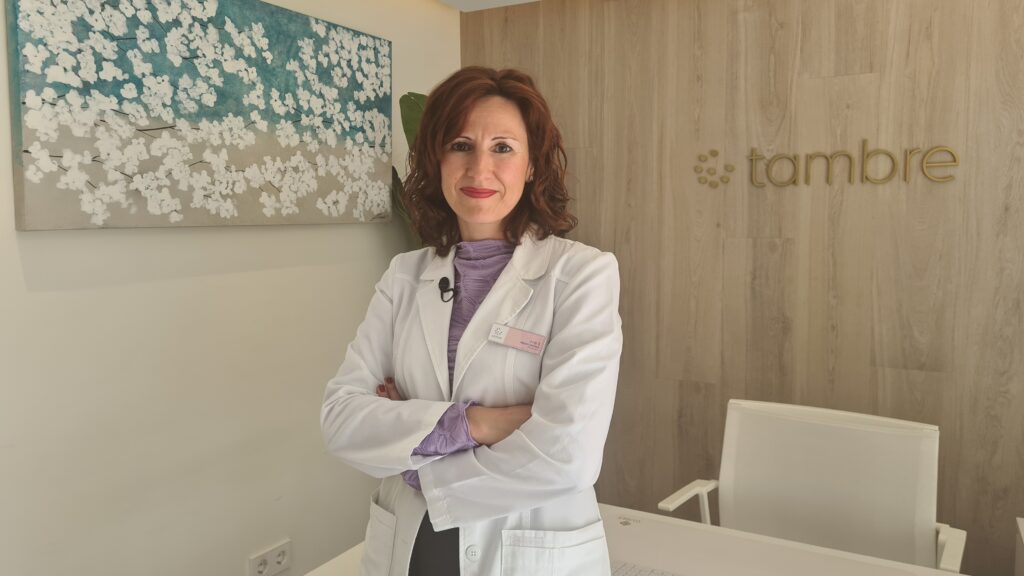blog tambre
How to approach egg donation treatment

Table of contents
Undergoing egg donation treatment is much more than a medical procedure: it involves making profound decisions, managing complex emotions and, in many cases, rebuilding expectations. Although each patient experiences it differently, there is one constant that runs through it all: the desire to be a mother. In this article, we explore, with our psychologist specialising in infertility, Raquel Urteaga, how this process is emotionally navigated and what tools can help you experience it with serenity and confidence.
When a woman or couple is faced with a diagnosis that requires treatment involving gamete donation, it is not always easy to come to terms with the situation. Our goal today is to provide the necessary information to people who have to resort to egg donation so that they can cope with the emotional process involved.

Raquel Urteaga, psychologist at Tambre and specialist in emotional support for egg donation.
Egg donation: the emotional process for the couple
The conversation we had with our psychologist has helped us empathise with the needs and feelings of our patients when they undergo egg donation treatment. Raquel Urteaga shows us what tools families can use to begin the journey toward egg donation with greater resilience.
Generally, the transition to egg donation is a difficult process for women or couples. It usually causes an initial shock, experienced more or less intensely depending on multiple factors such as previous struggles, the patients’ personalities, their desire for a child, expectations regarding offspring, perceived social or family pressure, etc. On top of this, there are many personal nuances each individual brings with them.
“It is common to feel frustration, helplessness, sadness or fear, but with some help, all these emotions give way to the true reason for the struggle, which is to be a mother and carry a baby”, says our psychologist.
What is the hardest thing for a couple to come to terms with when they find out that their only hope of having a baby is egg donation?
On the one hand, Tambre’s psychologist explains that the hardest part is usually the feeling of having to give up contributing their own genetics to the baby. On the other hand, there are women or couples who are concerned about the same issue but from a different perspective. “Sometimes what prevails are fears related to the gamete not being theirs, such as whether they will feel rejection or whether they will be able to love the baby in the same way,” emphasises the specialist.
These are questions that, as mothers with their children in their arms say, later lose all their importance. However, at the beginning, it can feel like an abyss.
Should you talk to your children about the treatment in the future?
Our psychologist says that this issue is one of the biggest concerns for women or couples, and—whether for better or worse—there is no single right answer. Furthermore, this is a point where the family and social environment in which the woman or couple lives is key. “The transmission of origins is something important that patients have many doubts about, and once again, guidance from specialists in this field is recommended”, says Raquel.
She adds that we must not forget that our Psychology and Emotional Support Unit helps women or couples who have taken, or are about to take, the step toward egg donation to understand their emotions and, in this way, see how we can support them in what is most advisable in each case.
Tools that families can use to cope with the situation
There are several challenges the couple may face, and therefore it is essential that they are able to express their fears and work through their genetic grief. At Tambre’s Emotional Support Unit, patients acquire tools to cope with the various emotions they will face and to ensure that parenting is natural and well adapted.
“Sincere and honest communication throughout this process will be the best starting point”, adds Tambre’s psychologist.
Can the treatment affect the couple’s relationship?
“Yes, it is undoubtedly a change from previous patterns, because—with rare exceptions—people do not think about becoming parents in this way, so it affects them in the sense that the approach differs from what they had anticipated. Now, this does not mean that it is a bad thing”, says Urteaga.
Egg donation raises questions and prompts people to ask themselves whether they want to be parents regardless of genetics. Couples who undergo treatment often overcome the crisis and generally grow stronger by putting their shared project above their earlier expectations.

A couple in Tambre’s at Tambre’s reception fertility clinic Madrid
The difficulty of separating genetics from motherhood
“It is difficult to separate genetics from motherhood because it is what we generally know—it is ‘natural’, it is what has always been. Resorting to donated gametes means straying from the path”, our psychologist continues.
In some families, genetics is not excessively important, but others base their self-esteem on it. In these families, the challenge is understandably greater. It is true that our society is making great strides in terms of conception and family formation, and this undoubtedly helps us open our minds to new models and ways of building families.
Furthermore, assisted reproduction is often a completely unknown field for those who undergo such treatment, so they are often surprised when they learn about the concept of epigenetics and discover everything the mother contributes to the embryo. The time spent in her womb uniquely modifies her baby, bringing about changes that only she can make possible, all thanks to the communication between the pregnant mother’s endometrium and the embryo. “These are the kinds of things our patients love to learn about”, concludes Raquel Urteaga.
If your specialists have recommended that you undergo egg donation treatment and you have any questions, remember that at Tambre we have a multidisciplinary team who can help you better understand the situation so you can move forward with your life plan. Contact us with no obligation, and we will provide you with all the information you need.


